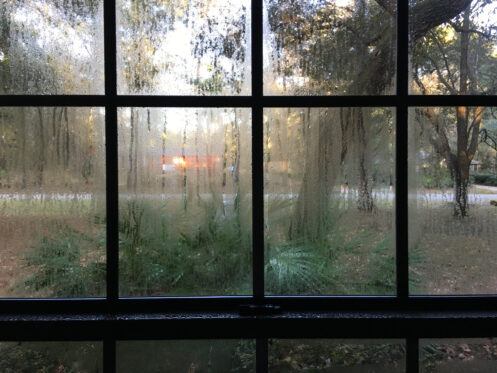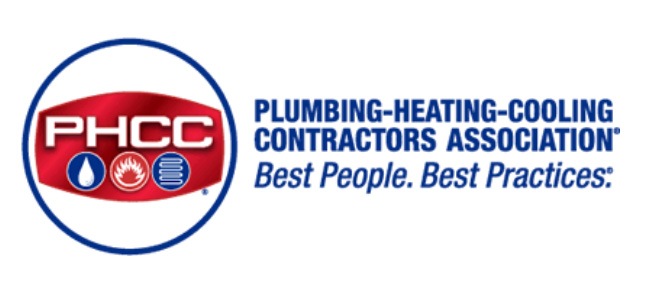High indoor humidity is a major problem that plagues many homes in Northern Virginia, especially during the extremely hot, humid summer months. High humidity negatively impacts comfort since humid air always feels much warmer no matter what the actual air temperature is. Many homes that are too humid often also end up having frequent issues with mold. In this article, we’ll explain the most common issues that contribute to high humidity and what options you have to help keep your home less humid.
Oversized or Poorly Performing AC
Many people are unaware that air conditioning doesn’t just remove heat from a house, but it also draws lots of moisture out of the air and helps to combat against high indoor humidity. If your AC or heat pump is close to 15 years old and you often have times when your home is much too humid, replacing it can make a major difference. A unit that is around 15 years old is basically at the end of its life and likely not working all that effectively.
Upgrading to a new unit will ensure that your AC system cools effectively and your home stays less humid. This is especially true if you opt for either a two-stage or variable-speed AC or heat pump. The reason is that these units are designed to run more slowly and stay on for much longer or even run constantly in the case of a variable-speed unit. This greatly reduces how much energy they consume, and the longer cycles also allow them to remove far more moisture from the air.
When it comes to air conditioning systems, bigger is definitely not better. Oversized air conditioners and heat pumps almost always have issues with short cycling, which is when they only even run for 10 minutes or less. This happens because they are so powerful that they draw much more heat out of the home in a shorter time. While this may sound like a good thing since it means the system will cool your home more quickly, it really isn’t. The problem when a system short cycles is that it can never remove much moisture from the home since it turns off so quickly. If your AC or heat pump is oversized, replacing it with a correctly sized unit will help to keep your home less humid and also lower your air conditioning costs by quite a bit.
Poor Ventilation
Many older homes are sufficiently ventilated simply because they have lots of places where air can get in and out. This usually isn’t the case with newer homes since they tend to be much better constructed. People, animals, cooking and bathing all release lots of moisture into a home. Without adequate ventilation, all of this moisture gets trapped inside and contributes to the home being much more humid.
Installing a mechanical ventilation system such as an energy recovery ventilator is a great option since the system will continually draw the stale, humid air outside and replenish it with fresh, outdoor air. Energy recovery ventilators also cool the air as it is drawn into the house and pull moisture out of it. This is important for ensuring that the system doesn’t just bring incredibly hot, humid air into the home. A ventilation system is also a great way to improve indoor air quality since it constantly circulates the air in the home and draws all of the polluted air outside.
Not Using Exhaust Fans
One common mistake many people make is not using the exhaust fans in their bathrooms and kitchens. Running the exhaust fan is important for removing all of the heat and steam that gets released when bathing or cooking. Exhaust fans also provide ventilation that draws not only heat and moisture outside but also airborne pollution. It’s important that your exhaust fans are the correct size for your kitchen and bathroom and that you leave them running for a minimum of 20 minutes after you finish showering or cooking.
Hidden Plumbing Leaks
Even small plumbing leaks can be a major contributor to high indoor humidity since all of the water continually evaporates and adds lots of moisture into the air. A leak is sometimes easy to spot since it will often cause paint to bubble and blister or produce a noticeable water spot on the wall or ceiling. Unfortunately, there are also many times when a home has a hidden leak that goes unnoticed for quite some time. This is why it’s important to keep track of your monthly water bills.
Your water bills will obviously be higher in the warmer months when you’re watering your lawn. Nonetheless, your water usage will usually remain at least fairly consistent from season to season and year to year. A sudden spike in your water bill when you haven’t been using much more water than usual is almost always a sign that one of your pipes is leaking. You may not think a tiny leak would make much of a difference. However, even an extremely small pinhole leak has the potential to waste hundreds or even a few thousand gallons of water in just one month and cause your water bill to suddenly spike. Having a plumber inspect your home and repair the leak will save you money on your water bills and also make a major difference in how humid your home is.
Open Windows
One major mistake many people who live in more humid climates make is opening their windows at night and shutting off their air conditioning. Sleeping with the windows open isn’t an issue in dry climates, but it is definitely not recommended in places like Virginia where the summers are usually incredibly humid. Turning off your AC and opening your windows leads to two separate but interconnected issues.
Even though your AC may not run all that much at night, it still helps to lower the humidity inside your home each time it cycles. If you shut your AC off, your home will almost always be quite a bit more humid in the morning compared to what it was when you went to bed.
The bigger issue is that leaving your windows open allows a huge amount of moist air to get inside. Lots of this moisture then tends to soak into carpets, walls and furniture and contribute to your home constantly being more humid. When this happens, it can be nearly impossible for your air conditioning ever to keep it up once you turn it back on. Studies have shown that sleeping with the AC off and windows open in a humid climate will also lead to your AC using much more energy. The reason is that the humidity gain from the open windows makes the AC system less effective and results in it actually running more each day than it would if you never shut it off.
Overcome Humidity Issues With a Whole-Home Dehumidifier
While an effective air conditioning system can definitely help with humidity issues, AC alone is often not sufficient to control indoor humidity in our area. If you’ve exhausted all of your other options and your home is still too humid, the best option is to add a whole-home dehumidifier to your HVAC system. This type of unit removes far more moisture in a shorter time than an AC system ever could and will ensure that your home never gets too humid. A whole-home dehumidifier also has the added benefit of making an AC system for efficient and more effective since air conditioning works far better when the air in a home is drier.
If you’re experiencing issues with high humidity in your home or your AC isn’t working effectively, you can count on Meade’s Heating and Air for help. We specialize in AC installation as well as maintenance and repairs, and our team can also help if you need to install a dehumidifier or any other type of indoor air quality equipment. Contact us today to learn more about how we can help you manage your home’s humidity level or to schedule any air conditioning or heating service in the Sterling area.




